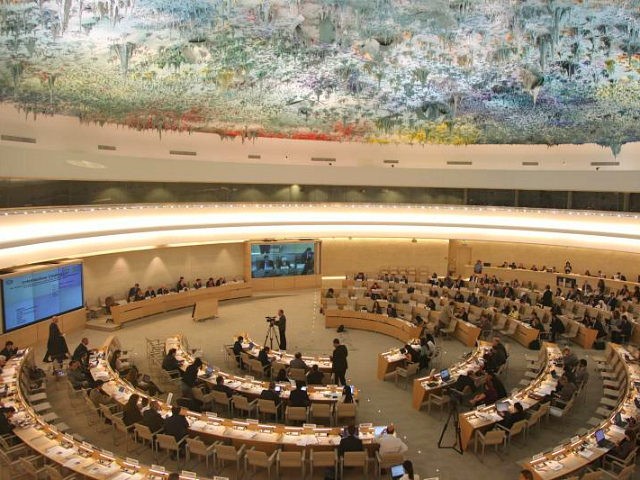The Trump administration slammed the U.N. Human Rights Council Monday after the Democratic Republic of the Congo, Pakistan, and Afghanistan were among the countries with abysmal human rights records elected to the body in charge of promoting such rights across the globe.
“Today’s election is yet another example of why the Human Rights Council lacks credibility and must be reformed in order to be saved,” U.S. Ambassador to the U.N. Nikki Haley said in a statement, reacting to the election.
The full list of countries elected by the U.N. General Assembly in a secret ballot are: Afghanistan, Angola, Australia, Chile, the Democratic Republic of the Congo, Mexico, Nepal, Nigeria, Pakistan, Peru, Qatar, Senegal, Slovakia, Spain, and Ukraine.
The selections were divided up by geographical location, with each region being assigned a certain number of seats on the controversial council, which the U.S. and Israel have criticized both for its membership and for its anti-Israel bias. President Trump, in his speech to the U.N. General Assembly last month, called the council’s membership “a massive source of embarrassment” to the U.N.
The 15 members will rotate into the 47-member council, replacing countries whose three-year term is up. They join a less-than-stellar human rights line-up on the Council in 2018, which will include existing members such as China, Cuba, Iraq, Venezuela, and Saudi Arabia.
Haley, a vocal critic of the Council who once called it a “haven of dictators,” pointed to Congo’s inclusion as particularly egregious, and yet another indicator that the council’s membership needs significant reform:
[The DRC], a country infamous for political suppression, violence against women and children, arbitrary arrest and detention, and unlawful killings and disappearances, has been elected to serve on what is supposed to be the world’s preeminent human rights body. In fact, the DRC – a country under investigation at the Human Rights Council – ran unopposed. That calls into serious question the General Assembly’s methods of selecting membership in the Human Rights Council.
The Bush administration boycotted the Human Rights Council when it was formed in 2006 as a successor to the Human Rights Commission, which was also criticized for anti-Israel bias and its membership. The Obama administration applied for membership in 2009, claiming it would allow the U.S. to reform the body from the inside.
The Trump administration has repeatedly floated the possibility of the U.S. leaving the council if its membership, and its bias against Israel, was not rectified.
In June, Haley visited the body in Geneva and called for Venezuela to step down if it did not mend its ways, hinted at possible U.S. withdrawal, and called on the council to focus more on human rights abuses than on Israel.
“It’s hard to accept that this Council has never considered a resolution on Venezuela, and yet it adopted five biased resolutions in March against a single country: Israel,” she said. “It is essential that this Council address its chronic anti-Israel bias if it is to have any credibility.”
In her statement Monday, Haley noted U.S. efforts to lead reform and did not make any reference to previous threats to leave the council, but questioned the ability of the council to speak with moral clarity when its membership includes countries with poor human rights records.
“We need a unified voice of moral clarity with backbone and integrity to call out abusive governments,” she said. “This election has once again proven that the Human Rights Council, as presently constituted, is not that voice.”
Adam Shaw is a Breitbart News politics reporter based in New York. Follow Adam on Twitter: @AdamShawNY.

COMMENTS
Please let us know if you're having issues with commenting.